College Students Face Unique Barriers to Voting
Courts have thrown out some requirements, but most college IDs can’t be used.
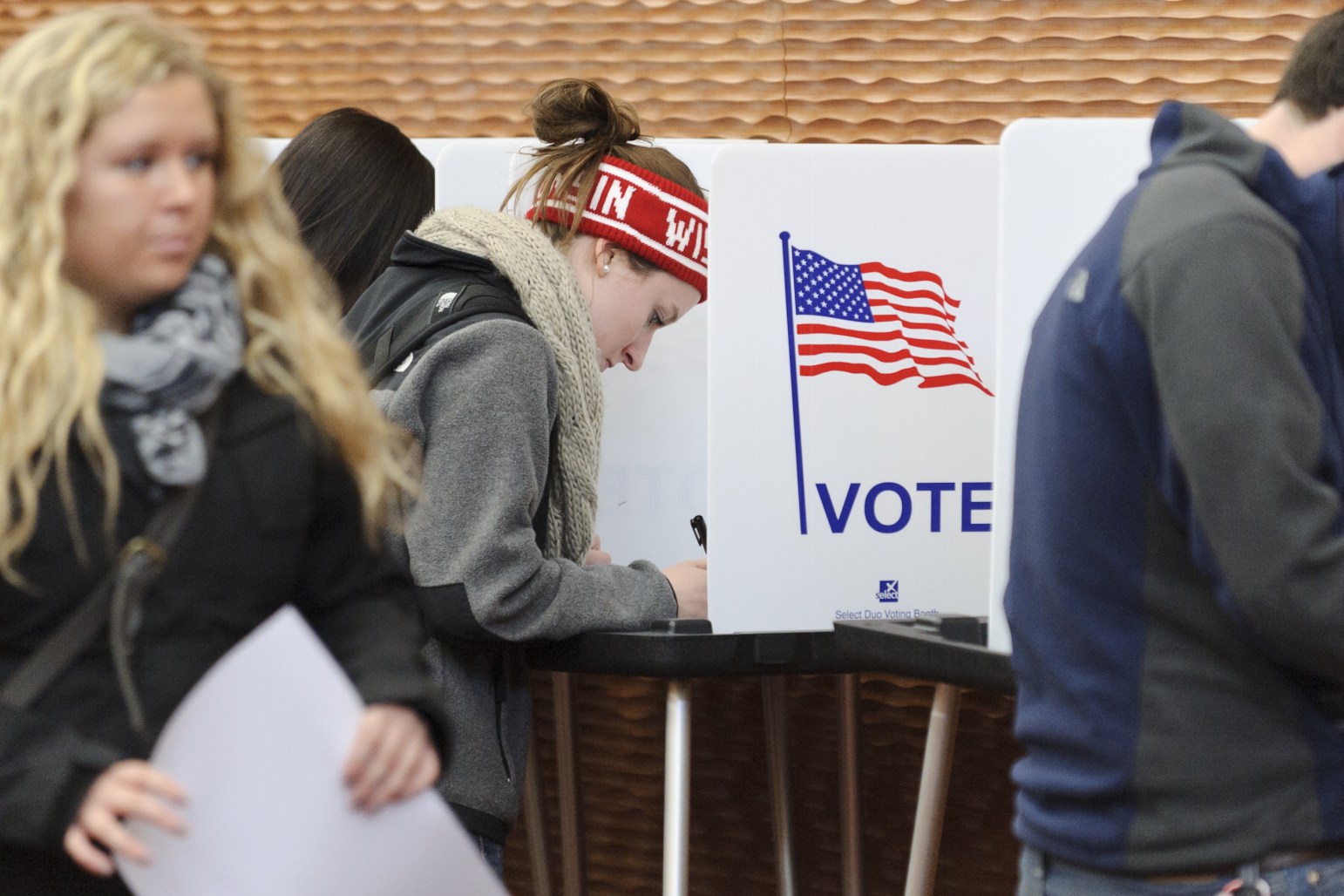
Eligible students cast their ballots for the presidential election and several state offices while voting at a polling place at Gordon Dining and Events Center at the University of Wisconsin-Madison on Nov. 6, 2012. Wisconsin’s on-again off-again voter ID law will require students to present a photo ID to vote in the Nov. 8 election. Photo by Jeff Miller of the University of Wisconsin-Madison.
There are many barriers that keep college students away from the polls. They include registration and voting requirements that vary from state to state, difficulty with obtaining the proper ID or proving residency, lack of familiarity with local issues and local candidates and uncertainty about how or where to vote — at home or at school.
Some laws passed over the previous four years, including in Wisconsin, have created even more barriers.
In August, a federal judge in Madison threw out some additional requirements for college students in Wisconsin, including a provision that had barred students from using expired but otherwise qualifying campus IDs for voting.
The trial included testimony that behind closed doors, Republican legislative leaders had discussed trying to suppress college turnout with the voter ID law. But U.S. District Judge James Peterson found the evidence was not enough to “establish discrimination on the basis of age.”
Nevertheless, additional requirements imposed by Wisconsin’s on-again, off-again voter ID law remain in effect for the Nov. 8 election. According to Common Cause in Wisconsin, regular student identification cards issued by just three of the University of Wisconsin System’s 26 campuses and seven of 23 private colleges are considered acceptable forms of ID for voting in the upcoming election.
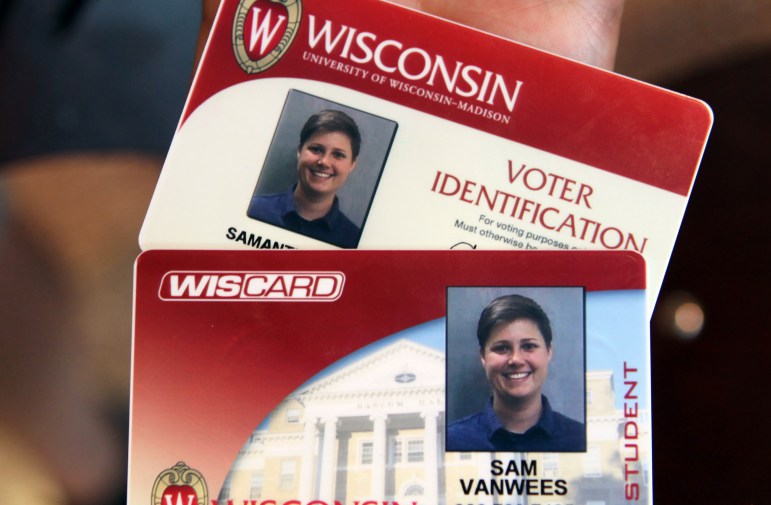
Sam VanWees from Des Plaines, Ill., says she was not aware she is eligible to vote in Wisconsin. She got her free voter ID card at Union South on the University of Wisconsin-Madison campus, along with her regular Wiscard student ID, on Aug. 30. Photo by Coburn Dukehart of the Wisconsin Center for Investigative Journalism.
All UW schools are now offering special voter ID cards, University of Wisconsin System spokeswoman Stephanie Marquis said. To use those campus-issued IDs to vote, students must also provide proof of enrollment.
In addition to campus-issued IDs, students can also vote by using a Wisconsin driver’s license, state-issued ID card, passport, military or tribal ID. Out-of-state students who want to get a Wisconsin driver’s license or ID card will have to surrender their driver’s license or ID card from their home state, said Reid Magney, spokesman for the Wisconsin Elections Commission.
To help students navigate the system, the newly formed Wisconsin Student Power Alliance plans to hire between 18 and 20 organizers on campuses across the state this fall whose first project will be a nonpartisan get-out-the-vote drive, co-director Lamonté Moore said.
Sam VanWees, a UW-Madison graduate student from Des Plaines, Ill., got her special voter ID at the end of August along with her WisCard student ID. Rather than drive back to Illinois or mail in a ballot, VanWees said she likely will vote in Madison for the upcoming election.
College students not active voters
Despite their usually low turnout numbers, college students have the potential to influence elections. There were 17.3 million undergraduate students enrolled in degree-granting postsecondary institutions in 2014, according to the National Center for Education Statistics. Experts predict that population will increase to 19.8 million by 2025.

Eligible students vote during the most recent presidential election at Gordon Dining and Events Center on the University of Wisconsin-Madison campus on Nov. 6, 2012. This November, in-state students with driver’s licenses can use them to vote, but students from out of state or those without driver’s licenses will need to find other forms of acceptable photo identification. University of Wisconsin System campuses are offering free special voter ID cards. Photo by Jeff Miller of the University of Wisconsin-Madison.
Yet millennials have the lowest turnout rates of all the generations. Because the majority of college students are under age 25, they make up a significant part of that age group. Some activists charge these young voters are being targeted by some of the recent changes in state voting laws.
“There’s a whole group of states that are trying to make it harder and harder every year to get to the ballots,” said Mike Burns, the national director for nonpartisan Campus Vote Project, which focuses on informing and helping solve student voter issues. “It’s stuff that boils down to a lack of information as opposed to a lack of interest.”
Students must show proof of residency
Burns said a “patchwork” of residency laws and voting requirements often confuses first-time voters.
In 1979, the U.S. Supreme Court affirmed a ruling that holding college students to a different standard of residency than other people or requiring them to swear they will remain in the community after graduation violates the 26th Amendment in the case Symm v. United States.
Appalachian State University student Rachel Clay served as an election protection field coordinator for a campus program and organized poll watchers. She said she and her poll monitors witnessed students at her North Carolina school who had issues meeting voter residency requirements.
“We also have a lot of people that live on campus, and they weren’t allowing students to use their on-campus address without proof of residency,” Clay said. “And basically, they weren’t accepting anything for proof of residency, so our on-campus students and our on-campus, out-of-state students didn’t know what to do at all.”
While Clay said this was — in part — because the election officials were unaware of the laws, it also was done because “the Board of Elections doesn’t really want students to vote.”
“Our polling officials, they are really not helpful,” Clay said. “They misinform. They lie to students. They scare students away from voting provisionally, and they take really, really long to do everything. So our lines are super duper long, and students just can’t stand in line for two hours.”
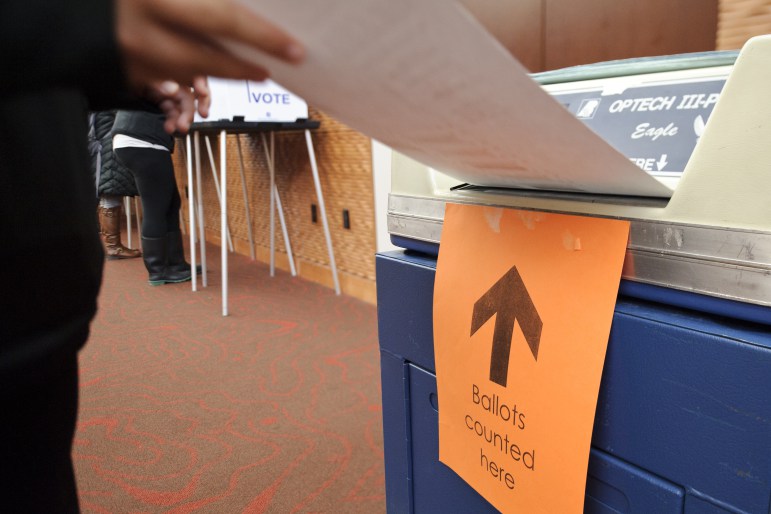
Wisconsin college students will be required to show specific forms of photo identification on Nov. 8. Here, students voted in the last presidential election in 2012 at Gordon Dining and Events Center on the University of Wisconsin-Madison campus on Nov. 6, 2012. Photo by Jeff Miller of the University of Wisconsin-Madison.
Watauga County Board of Elections Director Matthew Snyder said when the issue was investigated in March, there was no “substantiating evidence” to Clay’s claim.
“They did address the issue on the first day of early voting with the poll workers to make sure they followed procedures,” Snyder said. “They found no evidence that workers were impeding the process.”
Article Continues - Pages: 1 2
Voting Wars
-
Millennials Could Decide The Elections
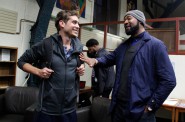 Oct 26th, 2016 by Elizabeth Campbell, Natalie Griffin and Amber Reece
Oct 26th, 2016 by Elizabeth Campbell, Natalie Griffin and Amber Reece
-
Why Felons Can’t Vote
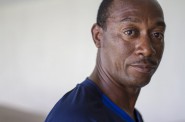 Oct 19th, 2016 by Kate Peifer and Rose Velazquez
Oct 19th, 2016 by Kate Peifer and Rose Velazquez
-
White Working-Class Voters Turning to Trump?
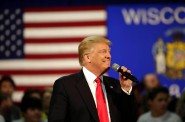 Sep 25th, 2016 by Emily Mills, Jimmy Miller and Lian Bunny
Sep 25th, 2016 by Emily Mills, Jimmy Miller and Lian Bunny






















Bogus. Your aim seems to be to make it easier for people to vote. Voting is a privilege. You should have to prove you have it. Non-American terrorists should not be able to vote, at least without identification.
Americans are born with the right to vote. Immigrants have to earn the privilege. Why shouldn’t we expect to prove our status at the poll?
It should be easy for citizens to vote, but Wisconsin is making it hard for some citizens to vote (i.e students and non-drivers).
If citizens must “prove” their right to vote, then all citizens should do so. The Wisconsin law exempts existing drivers from this rule. (Older drivers have never been asked to produce a birth certificate.)
Isn’t this story about college students? Why is someone talking about terrorists and immigrants?
Wow.. “voting is a privilege”. No.
It is a right we have as citizens of this nation.
Also the article describes a *your photo ID isn’t good enough* situation where students can prove they are who they say they are.
College students, terrorists… same difference.
Voting isn’t a “privilege.” What utter crock. Wisconsin’s war on democracy continues, aided and abetted by those who let irrational fear take the helm.
Voting is not a privilege for US citizens, it is a right. As long as you are a citizen and you can demonstrate that, within reason, then it is your right. Now that the US system provides voter ID cards to any students who requests them, and the largest private colleges and universities do the same… there are not many people who should have any inconvenience, especially since they can use a passport. Worst case scenario, they get a WI drivers license while they live in WI for school.
I do think it should be a little bit easier for college students, but I don’t see any undo burden here.
UW system, not US….
The problem is that these laws are targeted specifically at Democratic-leaning demographics. The consequences of this imbalance is that they have an effect of making the outcome of the election LESS representative of the will of the people, instead of more.
What a joke…and behind the closes doors -wooo! Republican henchman were destroying college kids right to vote. Give me a break and Early voting in Madison and Milwaukee is September 26th. September 26th. In Glendale, I will have to wait until late October. It is nice that Tom Barrett has money to stuff voting boxes but when young African Americans are living and drinking lead poison Barrett insists there is no money in the budget for the weakest among us.
I’ll accept your (rather emotive and all over the place) non-refutal as a tacit concession.
Passionate red herring, non-sequitor, adding insult to injury, and unsubstantiated accusations for the win.
Jason that comment is rambling nonsense. It reads like a script that sits in front of someone who is a regular caller to Mark Belling’s show. You must be the guy on Green Bay Road near Mill with the Trump sign.
Funny I am a few blocks away but I too have noticed that. Does that guy value his home or life for that matter That guy must have 200 Trump signs. I can just imagine you going over there every night to deprive him of his want to display that banner. I think most conservatives around Milwaukee have learned not to place a Stand with Walker sign on their vehicle for fear of keying or a slashed tire.
” I think most conservatives around Milwaukee have learned not to place a Stand with Walker sign on their vehicle for fear of keying or a slashed tire.” Stupid is as Stupid does.
Value his life? In Glendale, because of a Trump sign? Jason you are a funny guy.
My toddler and I removed it (again) last night. It’s all part of his training. We live near you. We’ll drop by one of these nights. I’ll look for the guy who is living in fear as a conservative in Glendale.
Vincent, you removed someone’s sign from their yard? I’m pretty sure there are laws against that. Or am I misinterpreting the situation? Is this not you stifling someone else’s freedom of speech on their private property?
Jason does bring up a good point, Democrats worry about voter ID laws giving advantage to responsible voters who have proper ID. However, at the same time they support voting laws that give the advantage to large urban areas that lean democrat such as extended early/absent voting hours that suburban and rural areas that lean Republican don’t have the resources for. Hypocrisy abounds.
My face is in my hand. AG, no, I did not remove a yard sign with my toddler in tow. For crying out loud. Unreal. I worry about you sometimes. I really do. No one is removing anyone’s yard signs in Glendale. Jason is being ridiculous, possibly on purpose. Unless he truly believes that the lives of conservatives in Glendale are in danger. Hell maybe you believe that too considering your comment above. Just, wow.
You completely mischaracterize what people fear when it comes to voter ID laws. It’s not about giving advantages. It’s about making sure people’s votes aren’t suppressed because, as you yourself said, voting is a right and not a privilege.
“However, at the same time they support voting laws that give the advantage to large urban areas that lean democrat such as extended early/absent voting hours that suburban and rural areas that lean Republican don’t have the resources for. Hypocrisy abounds.”
It’s needed a lot in urban areas becuase urban areas gerenerally dont have the capacity for all the voters. they get really long lines. suburban areas don’t need it – they have short lines and they easily have the capacity to handle their voters.
nonetheless, they’re certainly welcome to it – nobody is fighting against rural areas having more early voting. they don’t really need it though.
This difference in capacity between urban and rural areas causes more urban voters to be disenfranchised. early voting helps mitiigate it, but you still get things like we saw in ohio a few elections ago where about 20% of the people waiting in line left because the wait was too long, and that decided the presidential election.
“It’s not about giving advantages. It’s about making sure people’s votes aren’t suppressed because, as you yourself said, voting is a right and not a privilege.”
Oh no – there are laws in place where people in urban areas get to vote twice. (sarcasm)
Happy Jack, what are you basing your knowledge of rural and suburban voting locations on? There are plenty of documented cases of long lines at the poles and for early and regular voting (where available) in rural and suburban locations. And if a rural area doesn’t have the resources to provide in person early voting after hours or on weekends, there will be no lines because that opportunity is not available. The early voting laws are a clear advantage to urban voters. How do we bend over backwards for urban voters but it’s ok to make voters in the suburbs or rural areas fill out absentee ballots since they can’t vote early in person?
Vincent, sorry if I missed your sarcasm… I missed it since it is not much of a stretch to imagine considering this sort of thing takes place all the time.
It does not take place in Glendale AG, where I reside and which I specifically mentioned. You should be sorry for thinking I would do that, and with my kid no less. Very sorry. Pardon me for not accepting your apology. We’ve disagreed to be sure, but that was over the line on your part.
It’s needed a lot in urban areas becuase urban areas gerenerally dont have the capacity for all the voters. they get really long lines. suburban areas don’t need it – they have short lines and they easily have the capacity to handle their voters.
nonetheless, they’re certainly welcome to it – nobody is fighting against rural areas having more early voting. they don’t really need it though.
This difference in capacity between urban and rural areas causes more urban voters to be disenfranchised. early voting helps mitiigate it, but you still get things like we saw in ohio a few elections ago where about 20% of the people waiting in line left because the wait was too long, and that decided the presidential election.
Trump does push the line of the 1st amendment – yelling fire in a crowded theater – at his rallies – inciting violence. There is a clear public safety concern.
Vincent, quit feigning insult… you’re the one who made the comment, you can’t expect someone to read sarcasm when the thing you’re saying is common.
HappyJack, clearly you don’t understand the situation in many rural and some suburban communities.
AG, clearly I don’t. I’m glad you were smart enough to draw that conclusion.
Once again, it is not common in Glendale. I was specifically talking about Glendale. Please read more carefully next time.
Not feigning anything. You were out of line. Simple as that.
Here’s a paper I found on voting line length, after a few seconds of googling.
I’m sure it will demonstrate, as AG aptly states is already “clear”, that I don’t know what I’m talking about.
https://www.supportthevoter.gov/files/2013/08/Waiting-in-Line-to-Vote-White-Paper-Stewart-Ansolabehere.pdf
If a voter is not intelligent enough or industrious enough to learn the identification and location realities of voting in their area, then upon what are they basing their voting decisions? I would guess they are basing decisions on things like pithy sound bites they see on social media, emotional drama experienced in political events and demonstrations, media stories about pantsuits and candidates mispronouncing cities in Syria, etc. We need an informed and representative electorate more than we need a large electorate.